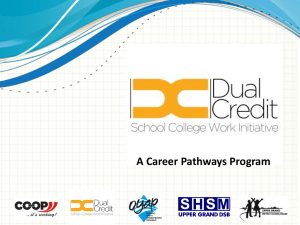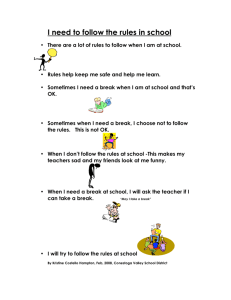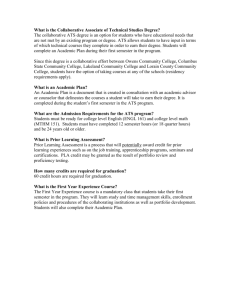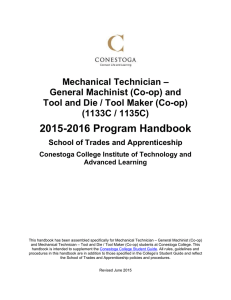2015-2016 Program Handbook Electrical Technician – Industrial &
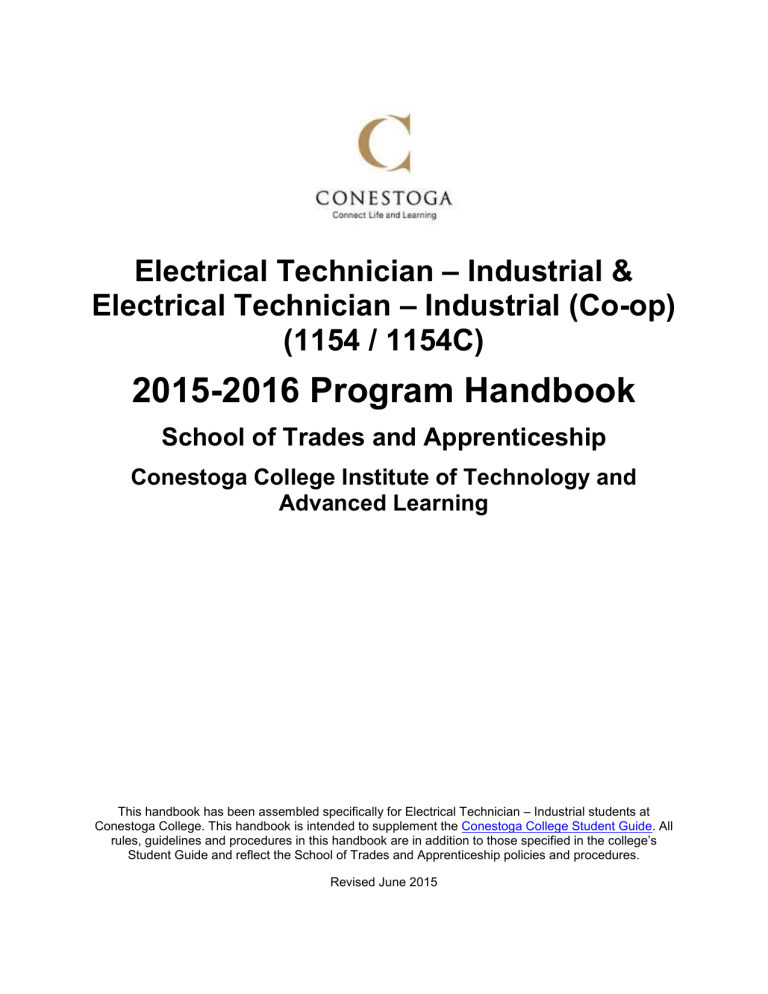
Electrical Technician – Industrial &
Electrical Technician – Industrial (Co-op)
(1154 / 1154C)
2015-2016 Program Handbook
School of Trades and Apprenticeship
Conestoga College Institute of Technology and
Advanced Learning
This handbook has been assembled specifically for Electrical Technician – Industrial students at
Conestoga College. This handbook is intended to supplement the Conestoga College Student Guide . All rules, guidelines and procedures in this handbook are in addition to those specified in the college’s
Student Guide and reflect the School of Trades and Apprenticeship policies and procedures.
Revised June 2015
Table of Contents
1) PROGRAM HANDBOOK GUIDELINES .................................................................. 4
5) PROGRAM INFORMATION & STANDARDS .......................................................... 8
5.5 Academic Standing and Promotion Requirements – Program Standard ............... 9
5.7 Evaluations (Deadlines, Tests and Examinations) – Program Standard .............. 11
6.2 Classrooms, Computer Labs and Shop Access................................................... 15
2
7.4 Physical Protection / Personal Protective Equipment (PPE) ................................ 17
8) CONESTOGA POLICIES AND PROCEDURES .................................................... 17
3
1) PROGRAM HANDBOOK GUIDELINES
The purpose of this handbook is to provide students with program specific details and other important information. The material in this handbook is accurate at the date of posting, and is applicable for the current academic year. Students will be informed of handbook changes that occur, if any, through college email. Program handbooks are updated yearly and students must check their program handbook for the current edition.
2) WELCOME
Welcome to the School of Trades & Apprenticeship and thank you for choosing
Conestoga for your post-secondary education in skilled trades.
Conestoga offers a comprehensive array of programs in the Construction, Motive
Power, Industrial and Service sectors to suit your interests and career aspirations. Our established partnerships with many successful local, national and international companies, result in program enhancements and significant career opportunities for our students.
Operating from campuses in Kitchener, Waterloo, Cambridge and Guelph, as well as a training facility in Ingersoll, we deliver current and relevant skills-based education and training allowing our students and graduates access to successful careers in the skilled trades.
I encourage you to take full advantage of the learning opportunities and resources available.
Sincerely,
Julia Biedermann, PhD, PEng
Executive Dean
3) PROGRAM ACADEMIC TEAM
Program Chair
Rachel Banham | ATS Room 100
519-748-5220 ext. 3831 | rbanham@conestogac.on.ca
Program Manager
Joni Jean | ATS Room 101
519-748-5220 ext. 3460 | jjean@conestogac.on.ca
Office Services Assistant
Bridget Vaillancourt | ATS Room 103
519-748-5220 ext. 2300 | bvaillancourt@conestogac.on.ca
3.1 Program Faculty
4
Program Coordinator
Steve Andrushak | ATS Room 218
519-748-5220 ext. 2464 | sandrushak@conestogac.on.ca
Chad Bishop | ATS Room 105
519-748-5220 ext. 2532 | cbishop@conestogac.on.ca
Mark Boucher | ATS Room 105
519-748-5220 ext. 2445 | mboucher@conestogac.on.ca
Chris Dallan | ATS Room 109
519-748-5220 ext. 3184 | cdallan@conestogac.on.ca
Chris Harnock | ATS Room 211
519-748-5220 ext. #### | charnock@conestogac.on.ca
Robert Haynes | ATS Room 211
519-748-5220 ext. 2447 | rhaynes@conestogac.on.ca
Mark Snider | ATS Room 105
519-748-5220 ext. #### | msnider@conestogac.on.ca
Scott Takacs | ATS Room 211
519-748-5220 ext. 2443 | wtakacs@conestogac.on.ca
Patrick Walsh | ATS Room 109
519-748-5220 ext. 3630 | pwalsh@conestogac.on.ca
Other Faculty
In addition to the core complement of your full-time program faculty, other faculty will work with you for the duration of this program. These include faculty from other Schools for breadth and or / general education courses, as well as faculty with particular expertise in specific areas of program focus.
Contact information for these faculty members will typically be provided on the first day of related courses.
3.2 College Support Services
Records Officer
Brenda Bender | Welcome Centre - Office of the Registrar
519-748-5220 ext. 3244 | bbender@conestogac.on.ca
Admissions Officer
Darlene Lavigne | Welcome Centre – Office of the Registrar
519-748-5220 ext. 2331 | dlavigne@conestogac.on.ca
5
Co-op & Career Services
Doon - Reception | 1A105 - Student Life Centre
519-748-5220 ext. 2298 | co-opandcareerservices@conestogac.on.ca
Financial Aid / OSAP / Student Awards
Financial Aid Office | Welcome Centre
519-748-5220 ext. 3378 | financialaid@conestogac.on.ca
Technical Support
IT Service Desk | Doon – 1E12
519-748-5220 ext. 3444 | itsdesk@conestogac.on.ca
4) PROGRAM OVERVIEW
4.1 Program Description
This innovative program offers a unique opportunity for students to study a significant portion of the electrical apprenticeship in-school curriculum which will aid them in their pursuits to obtain employment in the field as an Electrical Apprentice or Technician.
This program will give the student theoretical and practical experience on residential wiring standards and practices, commercial wiring techniques and applications as well as industrial controls. The field of study will also include the industrial application of power systems, electrical motors, motor controls, generators, transformers, programmable logic controllers, solid state controls and instrumentation.
The student will gain advanced knowledge of electrical theory and its application to a variety of practical situations. The student will be well versed in a variety of skills such as troubleshooting electrical systems, quality assurance and testing, and proper meter usage. In addition, the student will constantly apply safety standards and practices
(including generic lock out/tag out procedures) to their work environment.
4.2 Program Learning Outcomes
Program learning outcomes can be found on the Electrical Technician – Industrial and Electrical Technician – Industrial (Co-op) program pages of the college’s website.
4.3 Program Curriculum Sequence
The following is the anticipated sequence of the two programs (co-op and non-co-op) for students beginning studies in the Fall of 2015. Occasionally, minor program design changes do occur and students are notified of these changes by the program coordinator before they are implemented.
6
Co-op Program (1154C)
Program Delivery
Level One
In school training:
Semester 1
Level Two
Location
Doon Campus, ATS Complex
In school training:
Semester 2
Level Three
Doon Campus, ATS Complex
Semester
Fall
Winter
Year
2015
2016
Co-op work term
Level Four
Co-op work term
Level Five
In school training:
Semester 3
Level Six
Co-op work term
In school training:
Semester 2
Level Three
In school training:
Semester 3
Field placement (competitive)
Field placement (competitive)
Doon Campus, ATS Complex
Field placement (competitive)
Doon Campus, ATS Complex
Spring/Summer 2017
Level Seven
In school training:
Semester 4
Doon Campus, ATS Complex Fall
Note: Co-op employment is not guaranteed by Conestoga College.
Non Co-op Program (1154)
Program Delivery
Level One
Location Semester
In school training:
Semester 1
Level Two
Doon Campus, ATS Complex Fall
Winter
2017
Year
2015
2016
Doon Campus, ATS Complex
Spring/Summer
Fall
Winter
Fall
2016
2016
2017
2016
Level Four
In school training:
Semester 4
Doon Campus, ATS Complex Winter 2017
Note: students who successfully complete all of their required in-school portion of the
1154C Program, but are unsuccessful in completing all of the co-op requirements may be eligible to transfer and graduate from the 1154, non co-op program. Refer to Section
5.9 for more information.
Current Program Design
Students can find their program design on the Student Portal by following the steps below:
7
1. Log in to the Student Portal
2. Click on ‘My Courses tab
3. Select ‘View Progress Report’ button
Courses are listed by level/semester. Students can also view courses for the most current program design for this academic year on the Conestoga College website. To find these courses, students need to scroll down the page to the ‘Program Courses’.
5) PROGRAM INFORMATION & STANDARDS
5.1 Academic Assistance
Academic assistance is available to students through a variety of avenues. The program coordinator and faculty can advise students on specific program and course information such as adding / dropping courses, special timetabling, etc.
Students can also access the Learning Commons website for detailed information on the academic services they provide, including learning skills, peer services, math and writing assistance.
Conestoga College is committed to providing a safe and accessible environment for students with disabilities. Accommodating disabilities at the college is a shared responsibility between students, faculty and administration. Students are responsible for providing relevant and up to date documentation of their disability to Accessibility
Services , when they first register. This documentation will allow the student to be considered for accommodations and access to available services.
5.2 Student Services
Refer to the Student Guide for information on student services including Counselling,
Student Financial Services and Student Life.
5.3 Academic Dates
Follow the link for a listing of important academic dates for the current school year, including a list of holidays when classes are cancelled. Students should be aware that programs within the School of Trades and Apprenticeship do not necessarily follow all of the listed dates. Speak with the program coordinator regarding program-specific dates, including Study Week, if applicable.
Program start and end dates, holidays and deadlines for course add / drop and withdrawal are located in the Student Guide . Course changes (add / dropping) may also be made through the Student Portal under the ‘My Courses’ tab.
5.4 Credit Transfers
8
Advanced standing is the admission of a student into a program in a semester beyond semester one of their program based on previous post-secondary learning and / or life and work experience.
Credits can be transferred for students who have proven that they have comparable or equivalent learning in a formal educational environment. Course learning outcomes will be the criteria for determining exemptions. The notation of “G” is used for the grade.
Prior Learning Assessment and Recognition (PLAR) is the method to establish eligibility for a credit in a given course for students who have proven that they have comparable or equivalent learning through significant life and work experience.
The maximum credits allowed through credit transfers and credits obtain through PLAR is 75 per cent of the program credits. Therefore, at least 25 per cent of the program credits must be taken under the direct supervision of Conestoga College faculty. Please note that PLAR and credit transfers can result in a status change to ‘part-time’, which could impact OSAP and other services offered through the Financial Aid office. In addition, students will not receive any tuition refunds or reduced tuition costs. Visit the Credit Transfer Office and PLAR webpages for more information.
Note: When a student moves from one Conestoga College program to another and where course numbers are identical, automatic credit is given if program passing grades are met. The course grade from the original course will stand.
5.5 Academic Standing and Promotion Requirements – Program Standard
It is the student’s responsibility to ensure that they have fulfilled the program design requirements necessary to graduate. If for any reason a student is concerned about their academic progress, they should arrange to meet with a full-time faculty member or the program coordinator.
Students must achieve a minimum passing grade of 55 per cent in all courses, including
General Education electives. Failure or withdrawal from any course(s) may result in the student not being promoted to the next academic level.
If a student withdraws from the program for any reason, they have a maximum of five years from their original start date in order to complete the program requirements and earn the related and current certificate or diploma. If the program design changes significantly during this timeframe there may be the necessity to fulfill additional program requirements.
Common Academic Decisions
At the end of each level / semester, the program team reviews students’ grades. Below are the most common academic decisions issued by the program team:
Eligible to Continue
9
Students that pass all courses, and complete their electives, are eligible to continue in the program.
Decisions (Pending)
Students that fail one course may request a supplemental assessment.
Supplemental Assessment: Students who have failed one course may request a supplemental assessment (a “make-up”). It is the student’s responsibility to check the grade postings. It is not the responsibility of the professor to seek out the student and offer a supplemental. Supplemental assessments may be approved by faculty, or the program team, if the student meets the following academic criteria:
1. No more than one failed course (F grade) in the semester.
2. The failed course (F grade) was within 5 marks (5 percentage points – 50 per cent to 54 per cent) of the required passing grade of 55 per cent.
3. Attended 80 per cent or more of the classes in the course in question.
4. No more than one other supplemental assessment over the duration of the program.
5. Must have passed at least one formal evaluation in the course.
The test must be completed within three weeks from the end of the semester. To register for a supplemental, the student must have an
Authorization for Supplemental form completed and signed by the program coordinator and submit the appropriate fee ($40.00) to the Registrar’s
Office. The student must provide proof of fee payment at the time of the supplemental exam.
Failure in the supplemental will result in no change to the original course grade. Successful completion of the supplemental evaluation will result in the minimum passing grade being awarded. The final grade as a result of the supplemental will be automatic and is ineligible for appeal.
Discontinuance, Withdrawals and Probation
If a student fails an elective course they must make up the credits prior to the completion of the program. If the failed course occurs in the final semester of the program, the student has five years from their start date in the program to earn the missing credits.
If a student fails a core course, i.e. non-elective, they may be discontinued in the program. Students may also be discontinued from a program based on misconduct, or in some sponsored programs, for lack of attendance.
For further information on discontinuance, withdrawals and probation, visit the Admissions section of the college website.
Discontinuance: Registered but Did Not Attend (DNA)
10
A missed course, DNA, will be considered as a course failure (mark of “F”) for purposes of discontinuance. Refer to the student guide for the refund deadline.
5.6 Attendance - Program Standard
Students are required to demonstrate the same attention to punctuality, attendance and safety as would be required by the business or industry in which they are or expect to be employed.
Attendance for each course will be monitored. If a student knows in advance that they will miss one or more classes (authorized absence), they must contact the faculty involved and let them know before the occurrence.
An authorized absence is defined as, but not limited to, illness requiring the care of a doctor, death of an immediate family member, or severe weather. All other absences are considered unauthorized. Regardless of explanation, if a student is absent they must contact the appropriate faculty or leave a message with the office services assistant.
In the event of an absence, it is the student’s responsibility to make up the missed work.
Due to limited shop / lab availability missed labs may result in a zero mark at the discretion of the faculty.
Students that arrive late for a scheduled class will be counted as absent after 20 minutes from the start of the class. Students that leave early, 20 minutes before the end of class, will also be counted as absent.
The School of Trades and Apprenticeship uses a ‘flag’ system to track unauthorized absences. The first missed class will result in a verbal warning. The second missed class will result in a ‘blue flag’ being issued. The third missed class will result in a ‘red flag’ being issued. At this point, a meeting will take place between the student and program coordinator and the student runs the risk of being ineligible for supplemental assessment opportunities due to poor attendance as well as possible discontinuance in the program.
If a student is to be absent from class due to a religious holiday, arrangements must be made in advance in accordance with Conestoga College’s ‘ Religious Holiday Policy and
Procedure ’.
5.7 Evaluations (Deadlines, Tests and Examinations) – Program Standard
The School of Trades and Apprenticeship has programs directly associated with industries that require commitment to deadlines. As part of our role as an educational institute, we emulate the ‘real world of work’ to provide students with the opportunity to recognize the essential skills required to be successful in their future career(s).
11
As such, the School of Trades and Apprenticeship has a ‘zero tolerance’ rule for unsubstantiated late submissions of assignments and projects.
Cases whereby the submission did not meet the deadline, due to medical illness, an accident, or a death in the immediate family, supporting formal documentation, such as doctor’s note, police report and / or medical forms, or copy of death certificate will be required. This must be included with the late submission and personally delivered to the appropriate faculty member and / or program coordinator.
This process ensures that all students within the School of Trades and Apprenticeship are following academic / industry protocol and are all treated fairly and equally in their evaluations.
Under no circumstances will a test or examination be permitted to be made up or rewritten for an unauthorized absence. A mark of zero will be recorded for any test or examination that a student misses for an unauthorized absence. Students are required to contact the appropriate faculty member prior to the scheduled test or examination if they know they will be absent. In the case of an authorized absence it is the student’s responsibility to make arrangements with the appropriate faculty member to complete the exam or test immediately upon their return to school.
5.8 Course Add/Drop
Due to the nature of School of Trades and Apprenticeship Program Designs, only in exceptional circumstances will students be permitted to add or drop courses.
Information on the course add / drop process can be found on the website; however, the program coordinator should be consulted by the student prior to the completion of a Course Add/Drop or Audit Form .
5.9 Program Transfer
Students who wish to transfer to another program with advanced standing, (e.g. into the co-op version of the same program), will need to complete paperwork in advance.
Students are to speak with the program coordinator to determine if space exists and to obtain the relevant paperwork. When a student moves from one Conestoga program to another and where course numbers / codes are identical or equivalent, automatic credit is given if passing grades are met.
5.10 Graduation
Students are eligible to graduate upon completion of all academic requirements in their program of study, including co-op placements if applicable. Students are expected to respond to their invitation through their Student Portal. Convocation ceremonies are held in the spring and fall of each academic year. Students, who take longer than the advertised program length, are responsible for completing any new or additional courses due to a program design change. Students who complete their program after
12
the scheduled completion date are required to fill out an Application to Graduate for and submit it with payment to the registrar’s office. Students who are discontinued or have withdrawn and then return to the college will be placed in the current program design and must meet all requirements to graduate. Rules surrounding graduating with merit are outlined on the academic recognition section of Conestoga’s website.
5.11 Program Advisory Committee (PAC)
Each program at Conestoga has a Program Advisory Committee (PAC), which is made up of industry and academic representatives, as well as current students. They meet several times a year to discuss the direction in which that industry is heading and any improvements that can be made to keep the program current. This helps to ensure that students are learning material that is relevant to their industry. At the beginning of each year, the coordinator of the program will ask for student volunteers. The coordinator will decide which students will represent the program. (One student from each year of the program will be selected.) The student representatives are expected to attend the meetings. Students must prepare and submit a report based on guidelines provided by the program chair / coordinator which will be presented at the meeting. Students are expected to be professional, dress in business attire and engage in discussions.
5.12 Communication – Program Standard
Conestoga College and eConestoga student email accounts will be used to communicate to students. Students are expected to regularly check their email accounts. Faculty will not respond to emails from non-Conestoga email addresses.
Faculty will respond to student emails by the end of the next business day after receipt of an enquiry.
The email utility in eConestoga is permitted for course content-related items only.
5.13 Co-operative Education Policy
Students must maintain the academic requirements of their program to remain in the coop stream. Their eligibility to participate in a co-op work term is evaluated at the end of the term that occurs two terms prior to the co-op opportunity. See the college website for information on co-op .
Co-op Eligibility – Program Standard
Students must have earned a minimum of a 2.5 session GPA (65% average) two semesters prior to the co-op work term to remain eligible for a co-op placement.
5.14 Awards – College Application Procedure
Conestoga has more than 400 awards, bursaries, scholarships and academic grants available to Conestoga students. These funds are made available to our students
13
through the partnerships we have established with local business and industry leaders.
To be considered for an award, complete the General Application available through the
Student Portal. Notifications and instructions to complete the application will be sent to all full-time Conestoga students’ email accounts in the Fall semester (Deadline: First
Friday in October) and Winter semester (Deadline: First Friday in February). Visit
The Financial Aid and Student Awards Office on Conestoga’s website for more information.
Awards – Program Specific
Every year, the School of Trades and Apprenticeship hosts an awards ceremony in May where close to $100,000 worth of monetary and product prizes are awarded to deserving students. Students are to speak with faculty for more information on possible awards.
5.15 Co-Curricular Record
Conestoga’s Co-Curricular Record (CCR) enhances your growth and development outside the classroom. The CCR is an official document, complementary to your academic transcript, which recognizes and records learning that you have achieved through approved co-curricular experiences at Conestoga College.
5.16 Student Feedback
Student feedback is an essential component of our continuous improvement process.
Our opportunities for student feedback include:
Student Appraisal of Teaching (SAT)
The SAT allows direct feedback from students on teaching for a particular course.
Completion of the SAT form gives teachers and academic managers valuable information to use for improving teaching at Conestoga.
The SAT process occurs at semester-end. One-quarter of the faculty is appraised per term, and each has two courses selected by their academic managers for appraisal. All teachers have a SAT review at least once every two years. Students complete either an electronic or paper copy of the SAT. A summary of results is prepared by Institutional
Research. The report is sent to the Academic Manager who shares the report with the faculty member AFTER all marks for the semester have been collected.
Key Performance Indicators (KPI)
All college programs in the province are evaluated using Key Performance Indicators
(KPIs) through the Ministry of Training, Colleges and Universities (MTCU). This survey is conducted each academic year. Strategic goals to improve the programs are developed from these results. This data and other data specific to the campus and the program / school are collected so that Conestoga College can continually improve quality.
14
5.17 Student Representation
CSI and Conestoga agree that a student has the right to invite a member of CSI to a student / faculty meeting, provided that 24 hours advance notice is given to faculty. This advance notice will ensure that all parties will have an opportunity to adequately prepare for the meeting.
5.18 Required Equipment, Supplies and Texts
Faculty members are responsible for distributing a suggested minimum tool list, where applicable. Texts required for each course are included on the pertinent course outline.
6) FACILITY INFORMATION
6.1 After-hours Access Policy & Parking
Conestoga College’s hours of operation are 7:00 a.m. to 11:00 p.m.
The after-hours access is a privilege, not a right. This privilege requires that students follow established guidelines, rules and regulations to ensure safety and security of person and property. Policies and procedures can be found on the website for the Security Services Department.
Parking
A system of paid parking is in place at Doon, Cambridge, Guelph and Waterloo.
Students must display a valid parking permit on their car windshield if parking on campus lots between 7:00 a.m. and 4:00 p.m. Information on parking regulations and permits can be found in the Parking Services section of the college’s website.
Room Access
Students needing access to classrooms or computer labs after hours on the Doon campus will be required to sign in, showing their student cards at Security before 11:00 p.m. each day that they wish to be on campus after 11:00 p.m.
Students wishing to leave and return after 11:00 p.m. will need to inform Security, who will readmit them upon their return. The Waterloo campus does not permit students to remain after 11:00 p.m.
Students must leave the classroom / computer lab if requested to do so by Security, maintenance and / or cleaning staff.
6.2 Classrooms, Computer Labs and Shop Access
There is no food permitted in any classroom, computer lab or shop. Beverages are permitted in unbreakable, re-sealable containers. Please note that in computer labs,
15
beverage containers should be placed away from the keyboard to prevent unnecessary damage.
Access to shops outside of regularly scheduled class times is not permitted without written permission from the instructor. For safety reasons access will only be granted for a minimum of two students. No equipment is permitted to be used without the presence and authorization of the instructor.
7) SAFETY INFORMATION
7.1 Basic Safety
Students are required to sign a Conestoga College Institute of Technology and
Advanced Learning (CCITAL) Acknowledgment of Safety Training and Responsibilities
Form (if applicable to program), which will be provided by the faculty at the start of the program.
7.2 Emergency Procedures
For life threatening emergencies, from any landline:
DIAL 9 (for outside line), then dial 911.
Notify the Security Office at ext. 3357 whenever emergency response personnel are contacted. The Security Office should also be contacted whenever there is an individual requiring medical attention but is not life threatening or whenever there is a minor injury and no medical attention is required. Conestoga College (Doon) has a nurse on duty
Monday to Friday, 8:30 a.m. – 4:30 p.m. who can be reached at ext. 3254.
There is an Emergency Guide located on Conestoga College’s webpage for information on how to respond to emergency situations.
Faculty will discuss the following at the beginning of each semester:
1. Fire Exits - the closest fire exit and any alternates
2. Fire Alarms - the location of the nearest pull station
3. First Aid Locations – usually the closest Security Desk/Office
4. Telephones - the nearest telephone to report accidents, illnesses or emergencies
5. First Aiders - identify lab faculty and staff who are trained in first aid
All accidents and injuries must be reported by the student within 24 hours to the program chair or program manager and an Incident Report Form will be completed and submitted to the Occupational Health and Safety Office ( safety@conestogac.on.ca
).
7.3 Machine Operation and Safety
16
Machine operation and safety requirements will be provided by the faculty responsible for the delivery of each course, as necessary. Students will sign-off after they have received safety training relevant to the machinery in use. Students must not use any equipment for which they have not received training or which they do not feel comfortable using.
7.4 Physical Protection / Personal Protective Equipment (PPE)
For classes with a shop component, the following are the minimum PPE requirements:
1. CSA-approved (Omega Symbol recommended) steel toe work boots or shoes
2. CSA-approved clear-lensed safety glasses
Other physical protection requirements in the shop include:
1. Long pants must be worn (shorts or capris are not permitted)
2. No loose coats or clothing items
3. Long hair must be tied back
4. No rings, bracelets or loose jewelry
Any additional personal protective equipment requirements will be provided by the faculty responsible for the delivery of each course.
Cell phones and other electronic communication devices may not be used in classrooms and labs without prior permission from the instructor or staff member.
7.5 Student Protection Acknowledgement
A Student Protection Acknowledgement confirmation pop-up will appear after the applicant logs in to the Student Portal. A PDF will direct applicants to the location of related policies, procedures and program information. Applicants will confirm that they have been duly informed by Conestoga and attest to that fact by clicking the acknowledgement box provided in the popup.
Once the acknowledgement box has been clicked, the applicant may proceed to enter the Student Portal. An email will be automatically generated and sent to the applicant recognizing their acknowledgement.
The Student Protection Acknowledgement confirmation pop-up will appear to all applicants and students once per academic year.
8) CONESTOGA POLICIES AND PROCEDURES
8.1 Additional Resources
17
For additional information on campus and classroom policies, procedures and guidelines, including the Academic Integrity and Copyright policies, please refer to the following links to Conestoga College’s website:
Policies, Procedures and Guidelines
2015-2016 Student Guide
18
